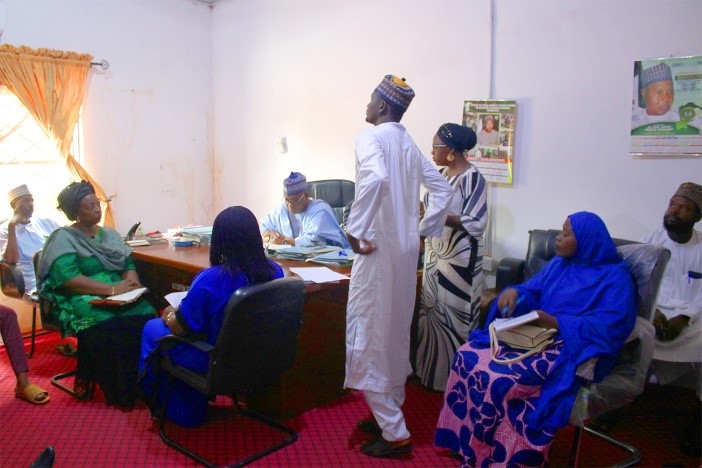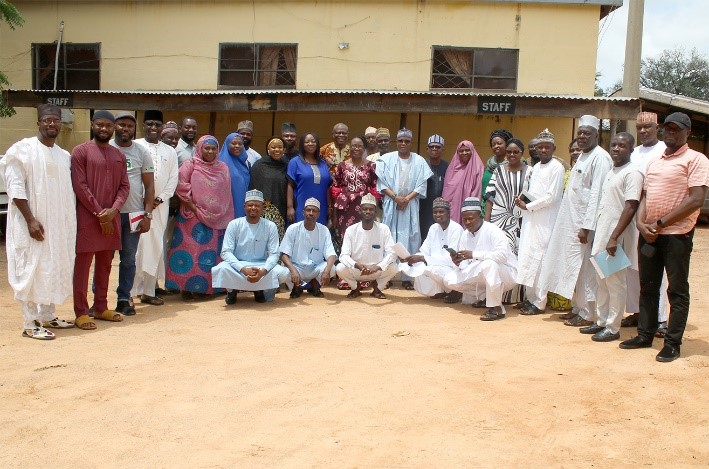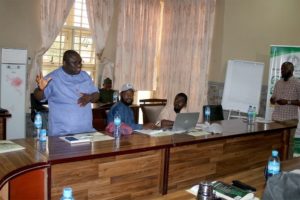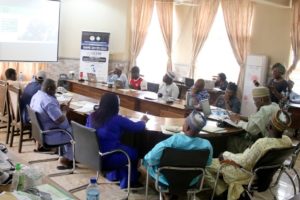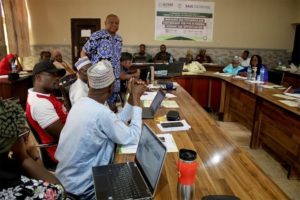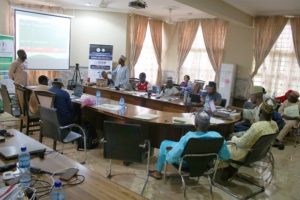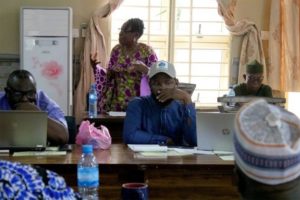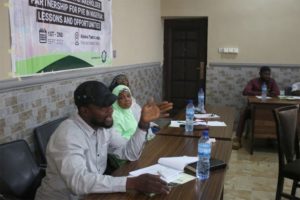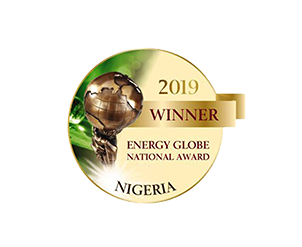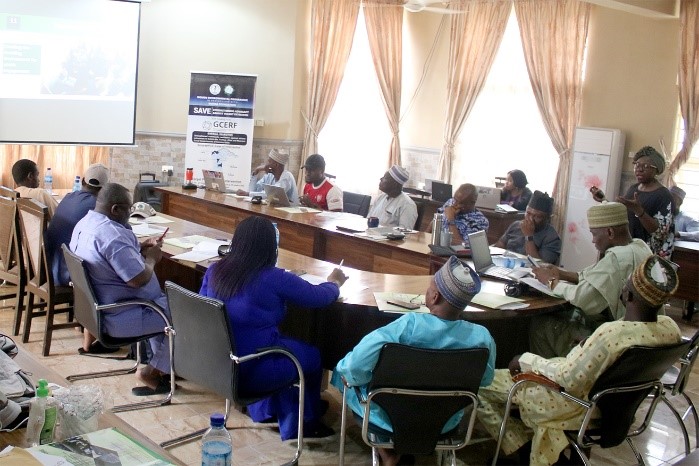
WEP Host a Community of Practice (CoP) on PVE in Katsina State
Background:
A community of practice is a group of people who have an interest, passion or concern in common and come together to explore these concerns and ideas, share experiences, learn and grow their practice. It is a global practice that enhances collaboration, communication and sharing knowledge between one another as a community.
It is against this backdrop Women Environmental Programme (WEP) hosted a two-day Community of Practice (CoP) meeting on Preventing Violent Extremism (PVE) from 1st to 2nd September 2022 at Katsina Tourist Louge, Katsina, as part of the ongoing Strengthening Advocacy Against Violent Extremism (SAVE) project in Katsina State. With the theme Engaging Multistakeholder Partnership for PVE in Nigeria: Lessons and Opportunities, the forum explored GCERF (Global Community Engagement and Resilience Fund) grantees’ engagements with different stakeholders and the opportunities it has created to expand, entrench and sustain the PVE interventions beyond project time frame and budget and also the approaches on improving reach to more partners and stakeholders to leverage on and adopt the Policy Framework and National Action Plan for Preventing and Countering Violent Extremism.
Present at the CoP were; representative of Office of the National Security Adviser (ONSA), GCERF Country Coordinator, GCERF Grantees; ActionAid Nigeria (AAN) and North East Youth Initiative for Development (NEYIF), sub-grantees; Murna Foundation, Global Peace Development, Democratic Action Group (DAG) and Alyateem Charity Initiative. Others include; National Orientation Agency (NOA), Ministry of Interior, and Ministry of Budget and Planning, representative of Partnership Against Violent Extremism (PAVE) Network, representative of Katsina state Department of Youth and Sports and other CSOs.
Discussions were led by WEP Programme Manager/SAVE Project manager – Tracy Ogbonna (Engaging Multi Stakeholder Partnership for PVE in Nigeria; Lessons and opportunities), Actionaid Nigeria (Factors Influencing Sustainability of Community Projects, Effective Youth Centred Partnerships for PVE in Nigeria), Jaye Gaskiya – PAVE Network Coordinator (The Role of PAVE Network in strengthening partnership and Sustainability of PVE Interventions in Nigeria).
Presentations:
Engaging Multi Stake Holders in Partnership for PVE in Nigeria Lessons and Opportunities. by WEP:
The project manager WEP explained the importance of partnership and collaboration with stakeholders in the implementation of the project. She expressed her satisfaction and support gotten thus far within the state and across the four (4) local government in Katsina state. She further stated some government Ministries and Agencies that WEP is collaborating with and their importance in implementing the SAVE Project. These include;
Office of the Head of Service; this office serves as a nexus between WEP and Office of Governor as well as provide support for the SAVE Project.
Ministry of education; WEP donated 2000 copies manuals, 1000 copies for mentorship program and 1000 copies for PVE for distribution to schools across the state. They also indicated interest in capacity building for teachers on PVE.
Traditional institution; created all the needed community acceptance for all project activities and ensuring project sustainability.
Ministry of women affairs; they also help and support all the project activities.
Small and Medium Enterprises Development Agency (SMEDAN); Conduct all the entrepreneurship training for all the beneficiaries for the project at all four local government of intervention.
State level multi-stakeholders’ coalition; support local structures established for security and PVE.
Security agencies; Provide updates on all security issues.
Department of Youth and Sport; creating the enabling environment for youth engagement.
Federation of Muslim Women’s Association of Nigeria (FOMWAN); support the project with structures in all the local governments.
Other partners are the Ministry of Justice, ministry of Agriculture, ministry of Information, ministry of religious affairs and the department of skills acquisition and vocational training among others.
Lessons learnt from the project:
- There is misconception that the project is a money-making opportunity.
- There is need to constantly update stakeholders on progress made.
- The stakeholders are willing to support, the important thing is to find strategic advantage where their niche can be strong and engage them.
- Some opportunities were also identified as a result of the partnership established with relevant government bodies;
- Potential investment of the private sectors to take up some of our activities for the project sustainability.
- Opportunity to train teachers on MENTORSHIP so that they can set up mentorship clubs in schools.
- Opportunity to utilize the skills and acquisition centers built and equipped by the government.
Effective Youth Centred Partnership for PCVE in NIGERIA by AAN:
The AAN Resilience Project Coordinator highlighted the need for governments, international organizations and civil societies to identify the youth population as agents of progress rather than agents of destruction and violence. In his presentation, he defined youth; according to the UN, the age bracket of youth is between the ages 15-24years while AU and ECOWAS placed the age bracket of youth to be between the ages 15-35 years. However, according to the National Youth Policy, the age bracket of youth is placed between 18-29years. Having identified the youth age, it was clear that the youth constitute the majority of the world population. Statistics were quoted to back this point, in Nigeria, the National Youth Survey conducted in 2020 by FMYS and NBS placed the youth(18-35years) population 48.5% of the total population of which 51.5% were females while 48.5% were males. Also, Violent extremist groups have taken advantage of inefficient governance and poor service delivery, high levels of society divisions along ethnic or religious lines exacerbated by elites and combined with low levels of trust, endemic sense of political and economic marginalization, low levels of development/high levels of poverty, geo-political forces and sense of injustice/inequality on global scale. For effective youth centered partnership for PCVE in Nigeria;
There is need to first address the drivers of violent extremism by creating youth centred activities such as National Youth Policies, employability, entrepreneurship and life skills. He cited practices by AAN;
- 78,000 youth across Kogi and Nasarawa were train and their capacities built in PVE intervention.
- The intervention also enhanced the network building capacity of the youth and strengthened the legal framework for youth empowerment.
- Youth inclusiveness in governance and peace clubs and girl safe spaces were also encouraged and formed to ensure sustainability of the project.
- Additionally, there were programmes that were aired on radios across the communities. Radios were distributed to peace champions who organised listening groups in the communities.
- The selected peace champions periodically organise quiz for the members of the listening groups.
- The quiz served as an instrument to cross check the commitment of the youth in the peace building of their communities and it encouraged the youth to always follow up and listen to the radio peace programs.
The Role of PAVE Network in Strengthening Partnership and Sustainability of PVE interventions in Nigeria by Chair of PAVE Network:
The presentation reinstated the need to advocate for the community approach in the PCVE intervention project. This implies that every stakeholder is important and should be carried along in order to achieve sustainable result at the end of the project. He heightened on the following;
- The need for coordinated advocacy to influence and transform PCVE policies. The need to leverage on coordinated capacity development for communities and civil society organisations.
- The network encourages stakeholders to increase and enhance their engagement with religious leaders and traditional leaders at community level.
- Communities are the primary focus and major beneficiary of reintegration projects and hence the need to encourage promoting inter-generational discussions as a means of building community social cohesion.
- PAVE Network also push for ways the government can design and implement trust building mechanisms between security agencies and communities.
- The Network work to ensure that PCVE interventions and programmes are inclusive and equitable based on social justice and do not violate the human rights of citizens, residents and communities. He concluded his presentation by reinstating
- The Network is committed towards working with all relevant stakeholders and communities to achieve the objective of safer and more resilient communities in Nigeria.
Violent extremism and food insecurity; WEP:
The project manager in her presentation spoke on the link between violence and food security and described how conflicts tend to have adverse effects on food production and overall sustainable development. The presentation showed how violent extremism reduces food availability and disrupt access to food. The fact the rural areas are hit the hardest and are the usually the victims of violent extremism, it adversely affects agricultural production and rural livelihoods. This in turn interrupt the food supply by rural farmers to the urban areas and larger communities. If not addressed, food insecurity may become one of the ways through which wider socioeconomic grievances are expressed.
PVE sustainability, challenges and recommendations in the face of rising insecurity; AAN:
Action Aid Nigeria made a presentation which showcased the importance of project sustainability and challenges faced amidst the rise of insecurity in Nigeria. The challenges include;
- Challenges of accessibility of conflict prone areas.
- Challenges of social destruction and population displacement.
- Challenges of dislocation and disruption of family and community.
Some of the recommendations highlighted to ensure sustainability include;
- Ensuring the community structures to network and partner with other community base association.
- The inter information exchange between community structures to promote learning.
- The need to prioritize proper planning (creation of a plan of action) and set a goal to achieve for a period of community structure.
- The need to strengthen the capacity of the community members.
- Engagement with private sectors as a resource mobilisation strategy
- Strengthening the skills of youth in resource mobilisation and advocacy skills for continuous engagement
- Encouraging youths to participate in community development activities.
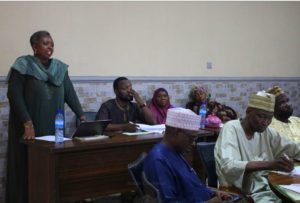 The GCERF National Coordinator in her remarks, expressed her pleasure at participating in the CoP. She reinstated GCERF commitment to continue to provide technical support throughout the duration of the project. The coordinator also stressed on the need to partner with private sectors and other stakeholders in order to guarantee sustainability and maintenance of the structures at the end of the project.
The GCERF National Coordinator in her remarks, expressed her pleasure at participating in the CoP. She reinstated GCERF commitment to continue to provide technical support throughout the duration of the project. The coordinator also stressed on the need to partner with private sectors and other stakeholders in order to guarantee sustainability and maintenance of the structures at the end of the project.
Advocacy Visit to the Ministry of Agriculture and Natural Resources;
On Day 2 of the CoP, Participants embarked on Advocacy visit to FADAMA III Office, a department under the State Ministry of Agriculture and Natural Resources. The team met with the representative of permanent secretary Ministry of Agriculture and Natural Resources. The aim of the visit was to solicit for support on the food security component of the project and strengthen partnership with the Ministry. The SAVE KATSINA project was introduced to the State Coordinator of FADAMA III and key advocacy messages were presented all centred around plead for support and collaboration.
The State Coordinator of FADAMA III was impressed with the project, he said the program is fully needed in Katsina State at this situation that banditry is seriously affecting the Agricultural activities and food supply across the state. He assured the team of his support and partnership, he further explained that the FADAMA III is implementing a project in some LGAs that is targeting real farmers to support them with agricultural inputs such as smart farming equipment, short and high yielding seeds and fertilizer, 1,650 farmers have benefitted from the FADAMA III project so far. He further reiterated that, the FADAMA III has extension Officers across the 34 LGAs that can support the organization if needed to implement their project. And that, the agency established a working relationship with Nigeria agro-meteorological agency that provide weather information to farmers. He therefore, concluded that, these are the leverage point the agency have that are open for collaboration with organization intending to intervene in areas of agriculture. He however, enjoin WEP to set up a strategic meeting with the agency to further discuss in details about the proposed intervention and possible areas of partnership and support.
